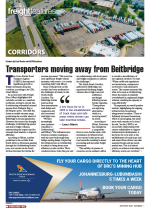Traffic on the African trade corridors is set to grow as African companies shift their attention towards regional and continental markets.During the first half of 2024, intra-African trade’s share of the total trade figures for the continent rose from 11% to 12%, according to Nee Coleman, economic affairs officer of the World Trade Organization.Continental imports dropped by 5% during the same period.“Even if trade growth remains limited in volume terms, initial estimates show an increase in the share of intra-African trade. “This development should reinforce the continent’s economic diversification efforts and mitigate the impact of external shocks,” Coleman said at the release of the WTO’s World Trade Report 2024 in October.Intra-African trade is driven mainly by manufactured products. While only 20% of Africa’s exports outside the continent are manufactured goods, 45% of trade between African countries comprises manufactured goods, according to the 2024 Afreximbank African Trade Report. These statistics support the findings of the latest Standard Bank Africa Trade Barometer. Respondents in 10 countries said they preferred trading with African and Asian countries, with “a significant number opting for African markets due to the lower cost of imports, good quality products, and fast response times”.Businesses in Namibia (75%), Tanzania (48%), and Angola (43%) showed the greatest interest in trading with the rest of the continent.The Namibian government has actively positioned the country as a logistics gateway for the southern region, with the Walvis Bay Corridor Group running advertisements highlighting market access through the corridors.Respondents reported that it was getting easier to trade in Africa.Infrastructure on the trade corridors remains one of the biggest constraints, with respondents believing that little or no progress is being made.Unreliable power supply is seen as the biggest obstacle to business growth across all 10 markets surveyed. Several mega generation projects across the continent are expected to improve supply in Angola, Ethiopia, Tanzania and Mozambique.Businesses are investing in solar to reduce the costs of running generators.Road and rail transport infrastructure was also seen to be posing significant challenges to businesses, although some improvement since the previous survey in May 2023 was noted.To achieve significant impact on corridor volumes, there is still some work to do to create awareness of the African Continental Free Trade Area (AfCFTA).Only 45% of surveyed businesses said they were aware of AfCFTA, with awareness increasing in Angola and Mozambique. This is attributed to participation by the countries in the Guided Trade Initiative (GTI) under the AfCFTA framework. However, fewer businesses reported tangible benefits from the agreement, with just 28% seeing access to larger markets and easier movement of goods and services as key advantages. “The decline in perceived benefits was particularly pronounced among small businesses, especially in South Africa, highlighting the need for ongoing efforts to translate AfCFTA awareness into tangible gains for African businesses and trade,” state the editors.Mozambique, Tanzania, Nigeria and Zambia improved in the overall Standard Bank Africa Trade Barometer ranking, while Kenya, Ghana, and Uganda declined. ER

